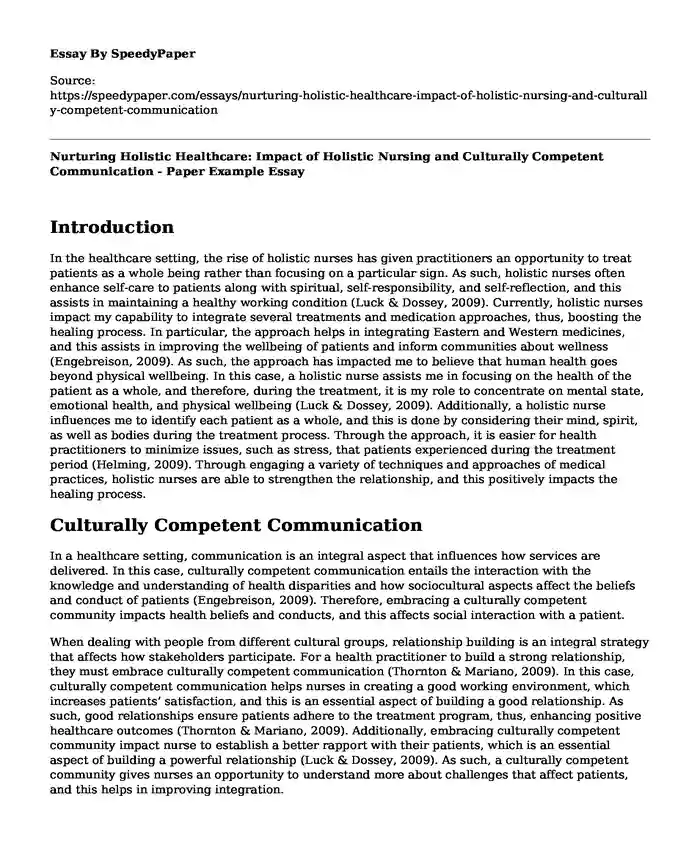
| Type of paper: | Essay |
| Categories: | Communication Nursing Healthcare |
| Pages: | 3 |
| Wordcount: | 665 words |
Introduction
In the healthcare setting, the rise of holistic nurses has given practitioners an opportunity to treat patients as a whole being rather than focusing on a particular sign. As such, holistic nurses often enhance self-care to patients along with spiritual, self-responsibility, and self-reflection, and this assists in maintaining a healthy working condition (Luck & Dossey, 2009). Currently, holistic nurses impact my capability to integrate several treatments and medication approaches, thus, boosting the healing process. In particular, the approach helps in integrating Eastern and Western medicines, and this assists in improving the wellbeing of patients and inform communities about wellness (Engebreison, 2009). As such, the approach has impacted me to believe that human health goes beyond physical wellbeing. In this case, a holistic nurse assists me in focusing on the health of the patient as a whole, and therefore, during the treatment, it is my role to concentrate on mental state, emotional health, and physical wellbeing (Luck & Dossey, 2009). Additionally, a holistic nurse influences me to identify each patient as a whole, and this is done by considering their mind, spirit, as well as bodies during the treatment process. Through the approach, it is easier for health practitioners to minimize issues, such as stress, that patients experienced during the treatment period (Helming, 2009). Through engaging a variety of techniques and approaches of medical practices, holistic nurses are able to strengthen the relationship, and this positively impacts the healing process.
Culturally Competent Communication
In a healthcare setting, communication is an integral aspect that influences how services are delivered. In this case, culturally competent communication entails the interaction with the knowledge and understanding of health disparities and how sociocultural aspects affect the beliefs and conduct of patients (Engebreison, 2009). Therefore, embracing a culturally competent community impacts health beliefs and conducts, and this affects social interaction with a patient.
When dealing with people from different cultural groups, relationship building is an integral strategy that affects how stakeholders participate. For a health practitioner to build a strong relationship, they must embrace culturally competent communication (Thornton & Mariano, 2009). In this case, culturally competent communication helps nurses in creating a good working environment, which increases patients’ satisfaction, and this is an essential aspect of building a good relationship. As such, good relationships ensure patients adhere to the treatment program, thus, enhancing positive healthcare outcomes (Thornton & Mariano, 2009). Additionally, embracing culturally competent community impact nurse to establish a better rapport with their patients, which is an essential aspect of building a powerful relationship (Luck & Dossey, 2009). As such, a culturally competent community gives nurses an opportunity to understand more about challenges that affect patients, and this helps in improving integration.
Despite the effectiveness of culturally competent communication, the process may experience numerous barriers. In particular, the language barrier is one of the major issues that hinder the application of culturally competent communication (Helming, 2009). Due to diverse cultural groups, some of the patients experience challenges in understanding the concepts that are expressed using English. Additionally, lack of knowledge and skills about numerous ethnic and cultural groups is another challenge that hinders the application of culturally competent communication (Helming, 2009). Normally, different communities have diverse cultural practices, and lack of understanding about these approaches may hinder how nurses hold the group (Thornton & Mariano, 2009). Lack of organization support is another integral aspect that hinders the use of culturally competent communication. Normally, it is the role of healthcare to provide supportive aspects to nurses to enhance their understanding of culturally competent communication.
References
Engebreison, J.C. (2009). Cultural diversity and care. Holistic nursing: A handbook for practice. 439-462, Jones & Bartlett Learning.
Helming, A. M. (2009). Relationships. Holistic nursing: A handbook for practice. 479-498, Jones & Bartlett Learning.
Luck, S. & Dossey, B.M. (2009). Nurse coaching. Holistic nursing: A handbook for practice. 501-511, Jones & Bartlett Learning.
Thornton, L. & Mariano, C. (2009). Evolving from therapeutic to holistic communication. Holistic nursing: A handbook for practice. 465-477, Jones & Bartlett Learning.
Cite this page
Nurturing Holistic Healthcare: Impact of Holistic Nursing and Culturally Competent Communication - Paper Example. (2023, Dec 30). Retrieved from https://speedypaper.com/essays/nurturing-holistic-healthcare-impact-of-holistic-nursing-and-culturally-competent-communication
Request Removal
If you are the original author of this essay and no longer wish to have it published on the SpeedyPaper website, please click below to request its removal:
- Free Essay on the Motorcycle Syndrome: The Fatal Mental Ride
- Lack of Healthy and Nutritious Food in Memphis, Essay Sample
- Block Chain Use in Making Government Decisions
- Essay Sample on Importance of Community Based Educational Approach
- Free Essay. a Successful Drug Abuse Recovery Program
- Free Essay on Why Is the Health Belief Model Such a Favored One for Ph Types?
- Free Essay Example: My Cousin
Popular categories




